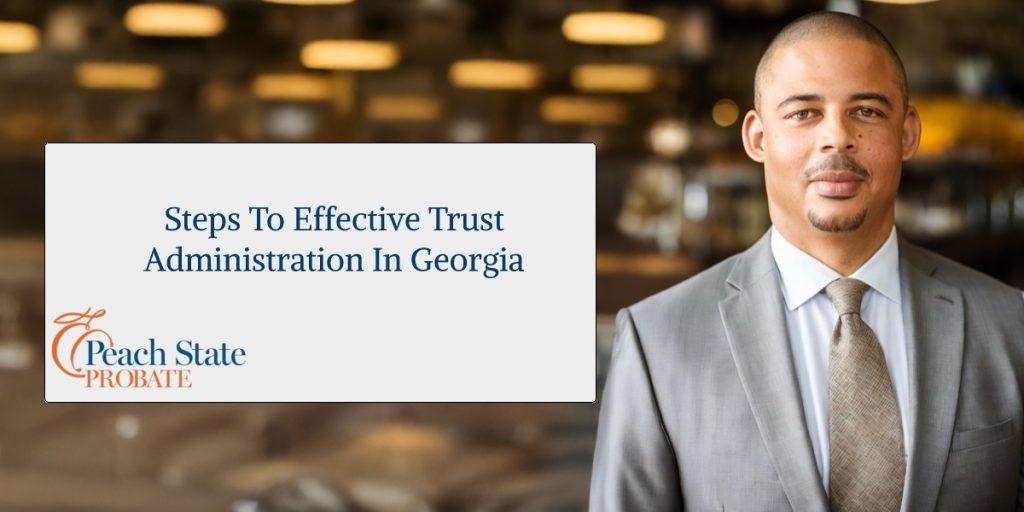## Understanding Trust Administration in Georgia
Trust administration is a crucial process involving the management and distribution of assets placed into a trust. This legal concept requires an understanding of various responsibilities that trustees undertake to fulfill the intentions of the grantor—the individual who created the trust. In Georgia, trust administration involves meeting specific legal requirements, notifying beneficiaries, and managing trust assets. It also requires abiding by fiduciary duties, ensuring that the trustee acts in the best interests of the beneficiaries.
In Georgia, the legal methodologies governing trust administration stem from both statutory laws and case law. Trusts can be revocable or irrevocable, each with unique attributes that affect how assets are managed posthumously or in the event of the grantor’s incapacitation. An effective trust administration process is vital to ensure that assets are conveyed according to the grantor’s wishes without unnecessary disputes among beneficiaries or complications arising during the asset distribution phase.
Understanding trust administration is particularly relevant in the context of estate planning. As individuals accumulate assets, they often seek ways to manage and transfer these assets within their family or to charitable organizations. A properly administered trust can provide financial security for loved ones, facilitate smooth transitions of wealth, and potentially minimize estate taxes. Thus, clarity regarding trust administration in Georgia is essential for anyone looking to establish a trust or serve as a trustee.
## The Importance of Trust Administration
The importance of trust administration cannot be overstated. It serves as a practical tool for managing an individual’s wishes regarding their assets after their lifetime. One fundamental aspect of trust administration is the safeguarding of assets. A trust provides a structured environment where assets can be protected from creditors and managed according to specific instructions. This can significantly benefit beneficiaries who may not be financially savvy, ensuring their inheritance is protected and wisely managed.
Additionally, trust administration plays a vital role in family dynamics. By establishing a clear legal framework for how assets will be allocated, conflicts among heirs can be minimized. This is especially relevant in families with complex relationships or disparate financial situations. A well-structured trust can help maintain familial harmony by alleviating fears of favoritism or mismanagement. Thus, the role of trust administration extends beyond mere asset distribution—it is a means of fostering unity and clarity among family members.
Finally, trust administration provides a level of privacy that is often not available through the probate process. Unlike probate, which is a public court proceeding, trusts can remain private, shielding personal financial matters from public scrutiny. This privacy can be particularly appealing for high-net-worth individuals or families who prefer to keep their financial affairs confidential. As such, engaging in effective trust administration strategies is essential for those looking to preserve wealth and protect beneficiaries.
## Legal Framework Surrounding Trust Administration in Georgia
Georgia’s legal framework for trust administration is rooted in the Georgia Code, particularly Title 53, which governs wills, trusts, and estates. The law delineates the fiduciary duties of trustees, outlining their obligations in managing trust assets and making distributions to beneficiaries. This legal foundation ensures that trustees understand their responsibilities, including the duty of loyalty and the duty to act prudently. Trustees are also required to provide beneficiaries with information about the trust, thereby ensuring transparency.
Moreover, Georgia law allows for both the creation of trusts and the appointment of trustees under various circumstances. Trusts can be created through a will, known as testamentary trusts, or through a trust document established while the grantor is alive, known as inter vivos trusts. Each type of trust has specific legal implications and requirements that a trustee must navigate during the administration process. Understanding these nuances is essential for effective management and compliance with state laws.
Furthermore, the Georgia Uniform Trust Code brings additional clarity and structure to trust administration. Enacted in 2010, this code standardizes trust laws across the state, addressing issues such as trust modifications and terminations, powers of trustees, and the rights of beneficiaries. By adhering to this legal code, trustees can ensure that they are acting within the boundaries of the law while effectively administering the trust. This legal framework is designed to facilitate smooth trust operations while protecting the interests of both the grantor and the beneficiaries.
## Practical Illustrations of Trust Administration
Real-world examples can provide illuminating insights into the intricacies of trust administration in Georgia. For instance, consider a scenario where a grandmother, having established a revocable trust, transfers her assets to it while stipulating specific conditions for her grandchildren’s inheritance. Upon her passing, the trustee must navigate these conditions, ensuring that funds are distributed according to the grandmother’s wishes. If the trust stipulates educational achievements as a requirement for disbursing funds, the trustee must collect documentation regarding the beneficiaries’ academic progress. This illustrates the active role trustees play in trust management, as they may need to collaborate with educational institutions to verify records.
Another practical example illustrates how a trust can protect a beneficiary with special needs. A parent may establish a special needs trust to ensure that their child receives financial support without jeopardizing eligibility for government assistance. In this case, the trustee must carefully administer distributions to meet the beneficiary’s needs while adhering to specific legal guidelines. Such trusts necessitate a nuanced understanding of both financial management and regulatory compliance to avoid any adverse effects on the beneficiary’s benefits.
In yet another scenario, a testator sets up a trust for spouses, categorizing assets to be distributed equally among children after both pass away. However, if the surviving spouse remarries, complications may arise regarding how the assets should be portioned between the new family and the children from the original marriage. The trustee’s role in mediating these situations becomes paramount, requiring sensitivity and adherence to the trust’s stipulations to protect the heirs’ interests. These examples underscore the importance of thorough planning and clear communication in trust administration.
## Proactive Steps for Efficient Trust Administration
Taking proactive steps can lead to more efficient trust administration. Initially, clear communication between the trustee and the beneficiaries is essential. Keeping beneficiaries informed about the status of the trust, ongoing management, and any conditions that affect their distributions is crucial for maintaining trust and transparency. Regular meetings or written updates can help beneficiaries stay engaged and alleviate potential concerns or disputes. This proactive approach can ameliorate feelings of uncertainty that often accompany trust distributions.
Additionally, proper record-keeping is fundamental in managing trust assets effectively. Trustees should maintain meticulous records of all transactions, communications, and decisions made concerning the trust. These records not only serve as a safeguard against potential disputes but also provide a roadmap for compliance with legal requirements. Accurate financial documentation can also aid in tax preparation and estate accounting processes, ensuring that all obligations are met seamlessly.
Lastly, seeking training or informational resources on fiduciary duties and trust management can empower trustees to perform their roles competently. There are numerous workshops, webinars, and online resources dedicated to trust administration that can provide invaluable insights. By arming themselves with knowledge, trustees are better prepared to handle challenges that may arise, thus streamlining the overall administration process.
## Common Pitfalls in Trust Administration
Trustees may encounter various pitfalls throughout the trust administration process, and being aware of these can significantly enhance management effectiveness. One prevalent mistake is failing to understand the trust document thoroughly. Each trust document outlines specific conditions, responsibilities, and distribution plans. Neglecting to review this document can lead to unauthorized distributions or actions that conflict with the grantor’s intentions. Such oversights can cause resentment among beneficiaries and potential legal challenges.
Another common error is inadequate communication with beneficiaries. Trustees often underestimate the importance of keeping beneficiaries informed about the trust’s status and management decisions. Lack of communication can breed suspicion or discord, leading beneficiaries to feel alienated or mistrustful. Clear, consistent communication fosters goodwill among beneficiaries and often mitigates potential conflicts before they arise.
Furthermore, neglecting tax responsibilities can create significant liabilities for the trust. Trustees must be mindful of taxes and deadlines associated with trust income and distributions. Failure to comply with tax obligations can result in penalties not only for the trust but also for the trustee personally, exposing them to legal and financial repercussions. Trustees should consult with financial advisors or tax professionals to ensure compliance and avoid these costly mistakes.
## When to Seek Legal Counsel for Trust Matters
Identifying the right moments to consult an attorney regarding trust administration is critical for ensuring compliance with legal obligations and navigating complexities. One scenario where reaching out to legal counsel is advisable is when the trust document is ambiguous. Ambiguities in the trust language can lead to differing interpretations among trustees and beneficiaries, potentially resulting in disputes. An attorney can provide clarity on the legal implications of various provisions, helping trustees make informed decisions.
Another key moment to seek legal advice is when significant changes occur among beneficiaries or assets. If a beneficiary’s circumstances change, such as marriage or divorce, or if the assets within the trust undergo substantial modification, it is prudent to consult legal counsel. An attorney can guide the trustee on how to manage distributions appropriately and address any new legal considerations that may emerge from these changes.
Moreover, if a dispute arises among beneficiaries, it is crucial to engage an attorney without delay. Disputes can escalate quickly, leading to costly litigation if not resolved amicably. Legal counsel can assist in mediating these conflicts before they reach a stage that necessitates court intervention, fostering a collaborative resolution and preserving family relationships. Knowing when to seek legal assistance is a vital component of effective trust administration.
## The Advantages of Legal Representation in Trust Administration
Engaging legal representation during trust administration offers numerous advantages. First and foremost, a knowledgeable attorney can provide protection against personal liability. Serving as a trustee involves legal responsibilities that can expose individuals to potential lawsuits from beneficiaries. With experienced legal guidance, trustees can navigate their duties without fearing repercussions, as the attorney can ensure compliance with all legal standards.
Furthermore, professional attorneys bring a wealth of specialized knowledge regarding state laws governing trusts. They can clarify complex legal terminology and requirements, ensuring that trustees fully understand their responsibilities. This knowledge is particularly beneficial in navigating intricacies such as tax obligations, required notices to beneficiaries, and the specifics of asset management. The attorney’s insight can profoundly impact the effective administration of the trust.
Additionally, an attorney can provide critical assistance in resolving conflicts and disputes that may arise among beneficiaries. With experience in mediation and negotiation, legal representatives can help mitigate tensions comprehensively, thus reducing the likelihood of costly litigation. Their involvement can offer a level of impartiality that reassures all parties that the trust is being managed fairly and according to the grantor’s wishes. This reassurance is invaluable for maintaining family harmony and minimizing stress during what can be a challenging period.
## How Peach State Probate Facilitates Achieving Effective Trust Administration
Peach State Probate stands out as a premier legal service provider in Georgia, specializing in trust administration with a focus on client-centered solutions. The firm’s well-rounded understanding of Georgia’s legal framework equips them to assist trustees in navigating the complexities inherent in trust management. Their expertise enables clients to establish and manage trusts seamlessly, all while adhering to the legal standards set forth by Georgia law.
By employing a collaborative approach, Peach State Probate ensures that the unique needs of each client are met. They prioritize communication, fostering transparent relationships between trustees and beneficiaries, which is vital for maintaining trust and confidence during administration. The firm actively engages with clients to provide educational resources, empowering trustees to feel informed and secure in their decisions. This dedication to client education enhances the trust administration process, minimizing misunderstandings and disputes.
Additionally, Peach State Probate offers mediation and dispute resolution services, preparing clients to handle conflicts as they arise. With a strong focus on maintaining family harmony, their attorneys work diligently to navigate complexities, protecting the interests of all parties involved. As an established name in Georgia probate law, they provide substantial assurance that trust administration will be carried out in the best interests of beneficiaries while upholding the grantor’s legacy. Find comprehensive information on trust administration and the responsibilities of trustees. Ensure the smooth management of trusts with our expert advice.




